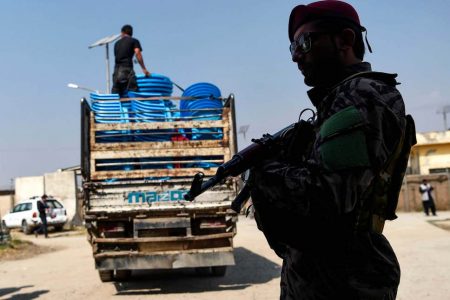
Mumbai-style terror attacks thwarted in run-up to Afghanistan election
A plot by the Taliban to carry out a “Mumbai-style” attack, using teams of gunmen to hit multiple targets in Kabul, was thwarted just before Afghanistan’s presidential election, according to senior government officials.
Around 14 insurgents were arrested, they said, and significant quantities of guns and explosives discovered in a series of raids in the capital after an intelligence breakthrough that led to weeks of surveillance.
The Taliban made repeated threats about the election held on Saturday, and warned people that any attempt to vote would lead to them facing attacks – demanding they stay at home instead. One of the messages said “take your shrouds with you” if going to the polling stations.
The spate of attacks has risen significantly since Donald Trump ended talks being held between the US and the Taliban in Qatar. He announced his decision after an American soldier was killed by a Taliban bomb last month.
Bombings, shootings, mortar and rocket launches took place for 48 hours in the run-up to the vote, with explosions in Kabul and the cities of Kandahar and Jalalabad.
Security forces recorded 273 violent incidents, 91 of which were directed at voting centres. Government officials stated that 29 soldiers and police officers had died and 79 insurgents were killed.
The Taliban claimed to have carried out 530 attacks across the country, most of which, they said, were successful without providing further details.
But the “spectacular” operation that the Taliban were promising, with Kabul the prime target, did not happen. The capital has been repeatedly hit by suicide bombers in recent months but did not experience a major attack on the day.
Hamdullah Mohib, the national security adviser to the Afghan government, said: “They were certainly planning something very big. It would have been a huge propaganda victory for them with all the international interest in Afghanistan because of the election.
“But with a combination of very good intelligence, hard work and a bit of luck we managed to stop it in time.
“Piecing it all together, it seems they had come into Kabul in small numbers and set up bases. We believe the plan was to seize a government building, or perhaps somewhere where foreigners were located, and then carry out other attacks in the city. You can imagine what we would have been facing if that happened.”
Mr Mohib continued: “We have been tracking them for a while and had to be patient. We didn’t want to move in too soon and waited until they were in place, and then we carried out our move.”
An official from a western country with troops deployed in Afghanistan said: “We thought it was a pretty impressive security operation on the days around the election, especially after a pretty bad suicide attack a week before.
“Coordinated multiple attacks with a possible siege-type situation, if that’s what they were planning, are very tricky to deal with, as we have seen in Mumbai and Paris. There are allied forces on standby, but it must be stressed that the Afghans lead missions themselves.”
Fear of violence, however, led to many people avoiding the polling stations and a low voter turnout. Initial estimates released by the Independent Election Commission showed that less than 25 per cent of the 9.6 million people who had registered to vote had actually done so.
Final figures confirming the estimate will mean the lowest turnout in Afghan elections since the fall of the Taliban regime in 2001. All three previous polls drew more voters, with around 60 per cent of the 12 million registered voters turning out at the last election in 2014.
More than a dozen candidates are taking part in the election, with the incumbent president, Ashraf Ghani, and his co-leader in the outgoing administration, Abdullah Abdullah, the main contenders.
Preliminary results are due by 19 October and the final result by 7 November. A second round would be held between the top two candidates if there is no overall winner.
Source: Independent





